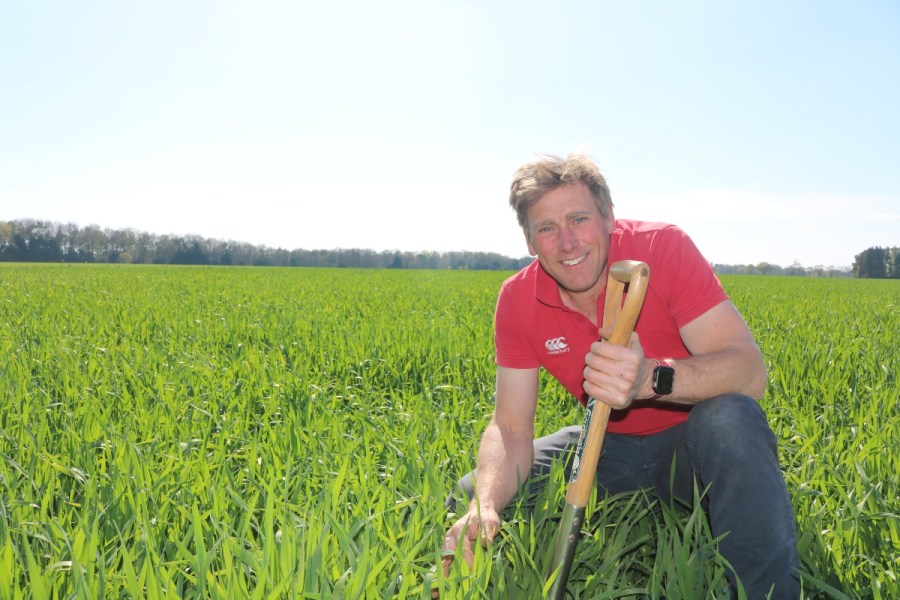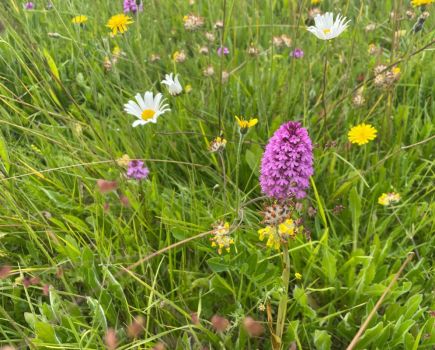The challenge for a North Norfolk estate is to retain productivity from its root crops while securing its long-term future in the face of climate change. CPM visits to explore progress.
Productive agriculture has to have a key role in sustainable farming systems in this part of the world.
By Tom Allen-Stevens
At first sight it seems not much has changed for the potato enterprise at The Wicken in North Norfolk. A destoner is slowly making its way towards the end of the field, while the planter has just turned on the headland.
Farm manager Toby Hogsbjerg takes a spade to the freshly worked soil, and truth be told, there’s not a lot of evidence of the cover crops that have held it together for the preceding few months.
“Potatoes are probably the most important crop for this estate. The challenge for us is to grow them in a way that produces a quality crop, but looks after its long-term future,” he says.
With a soil type that varies from blowing sand to sandy clay loam over chalk, potatoes, along with sugar beet and onions, drive the productivity of the 980ha arable estate near Swaffham. But a changing climate puts these fragile soils among those at highest risk in the UK – for those who live locally, dust storms are a common occurrence as the wind displaces soil unprotected by green cover. With a soil organic matter of less than 2% and rainfall predicted to reduce over the next few decades, there’s concern this productive arable heartland sits on a ‘knife edge’.
The rotation was one of the first things Toby addressed when he arrived at The Wicken in October 2018. “We now have nine crops across the rotation. Potatoes are grown no more than once every eight years, onions are one in six and sugar beet no closer than four years apart.
“In front of all of these is a cover crop tailored not only to build the soil structure, but to help the crop access the nutrients it needs. Carrots were dropped because they were doing too much damage to the soils, and we’ve taken the management of all crops in hand, rather than leasing land out, to ensure a soil-first approach to root-crop management.”
He’s been working with Ian Robertson of Sustainable Soil Management to help achieve this aim. But the whole team of five on the estate are very much involved in the discussions and soil inspections that determine how this will be done. “The social side of life on the estate is very important for us – we look to balance this alongside its productivity and biodiversity,” explains Toby.
The mix of cover crops is carefully tailored to the following crop. In front of potatoes, buckwheat is there to help release phosphate, linseed and fodder radish put roots down at depth, while phacelia spreads fibrous roots near the surface. Vetch and clover provide plenty of green cover and help to fix nitrogen.
“For sugar beet, nitrogen fixing and a good green cover are the priorities, so vetch, crimson and berseem clover are the main species. The cover crops are grazed by a flock of 2500 sheep, rotated and moved on quickly to maximise the benefit we get from them,” he adds. In common with most farms in the area, The Wicken doesn’t have its own livestock, but the relationship with the local shepherd “works well”, he says.
A firm believer in making incremental changes, backed up by on-farm trials, Toby put a number of cover crop mixtures under scrutiny in a 22ha field in front of Daphna sugar beet last year. Four different mixes were planted at right angles to the direction of the crop. Overlaid were four different nitrogen regimes.
“One cover crop was designed for maximum rooting, another for N-capture, a third was a bespoke mix, and there was one other standard mix. Two tramlines received no N at all, then there was an application of turkey litter across the rest – we spread about 1500 tonnes each year that delivers 45kgN/ha, along with a considerable contribution of phosphate, potash and sulphur.”
Two tramlines received DAP, adding 20kgN/ha while N across the rest was topped up to 110kgN/ha. “With sugar beet, it’s difficult to know what the yield differences are, although the field produced an average 71t/ha and there were no discernible differences between the N treatments. This year, we’re applying the turkey litter and DAP, but don’t intend to apply any more N unless the crop shows it’s going short,” says Toby.
He’s keen to stress that none of the changes being made across the farm are particularly ambitious or radical, but benefits from the small, carefully applied changes in practice are beginning to add up. “Winter wheat yields 8.5t/ha and spring barley 7t/ha. These are respectable for our soil type that we’re achieving with a total of 180kgN/ha on wheat, for example,” he says.
Toby moves from the potato field to the one next door in which peas have emerged and are growing well. The 40ha crop represents the fourth non-cereal cash crop in the rotation. “This is one crop after which we can min-till wheat. We’ve reduced cultivations across the rotation, but have only made little changes – you can’t direct drill after potatoes or sugar beet.”
So the plough still very much features as an essential tool to establish crops in soil that doesn’t self-structure, and an Amazone power-harrow combination drill puts much of the cereal seed in the ground. But an onion bed can be achieved without the repeated deep cultivations employed previously. A 4.5m Horsch Terrano is fitted with either wide or narrow wings to match the task at hand and a seeder box to establish the cover crops.
“We establish most cash crops in two passes. It’s early days and the benefits from the cover crops will take time, but we are seeing improvements in terms of fewer, shallower passes and diesel savings – these amounted to 8000 litres last year.”
Toby moves next to a field of hybrid winter barley. Here it’s more of a job for the spade to bring up the roots of a crop where the soil has settled in around it. But you don’t need to see them to know they’re benefitting the canopy above.
“The crop management is focused on building a good biomass both above ground and below it,” he explains. “We apply biostimulants and PGR to encourage rooting, while nutrients are carefully matched to crop need. We can drill early as grassweeds aren’t really a problem. But the important thing for us is to retain a healthy green canopy for as long as we can in soils that don’t retain their moisture. This is where a good fungicide policy pays dividends.”
Almost all of the cropped land can be irrigated, and Toby makes good use of soil moisture probes and the farm’s weather station to tailor water use to crop need. Disease modelling and blight forecasts help him stay one step ahead of threats and maintain an even, green productive crop canopy for as much of the season as he can.
“We get a lot of support from McCain and Bird’s Eye who buy our potatoes and are keen for us to reduce our carbon footprint. But it’s a priority for the estate anyway – for these soils to remain productive they must be managed with the long-term future in mind. We’re also keen to support its thriving biodiversity.”
With that he gestures to the field margin with its pollen-and-nectar cover just putting out the first flowers of the season. There’s a total of 120ha in Countryside Stewardship, pasture or other environmental management and a further 40ha of woodland.
“Productive agriculture has to have a key role in sustainable farming systems in this part of the world. For us it’s about encouraging a soil that works better for us, rather than mauling it around. We’re learning through the small benefits we’re getting from rotational changes and from cover crops, through on-farm trials and trial and error. It’s not a dramatic step change, but it is progress towards a sustainable system.”
What makes Toby Hogsbjerg a Climate Change Champion?
Innovative ideas
With a clear focus on the long-term future of The Wicken, Toby has set about securing this through progressive small steps. These are underpinned with on-farm trials and monitored objectively.
Productivity push
While root crops remain the dominant productive element for the business, reliance on synthetic nitrogen has been reduced through judicious use of cover crops and bought-in turkey litter. Crop management is geared towards maximising green area cover.
Cultivation care
There’s limited potential to reduce reliance on the plough where root crops dominate on soils that don’t self structure. However, both the number of passes and cultivation depth have been gradually reduced and benefits are beginning to show.
Bio-based boldness
The approach at The Wicken revolves around securing the long-term future of a North Norfolk estate, and Toby achieves this through balancing its social side with the aims for productivity and biodiversity.
Fragile soils can thrive when AgBalance applied
Joining Toby on the tour of The Wicken are BASF UK sustainability manager Mike Green and local BASF agronomy manager Hugo Pryce. Hugo recognises the challenge facing The Wicken as one that many growers in the area share.
“These blowing sands are on a knife edge. Root crops form a very important part of the local agricultural economy, and it’s essential the farms growing them get a decent profit. But it’s equally important that soils are managed sustainably.”
Mike agrees. “These soils are more impacted by climate change than most. If society has a demand for crops such as potatoes and sugar beet, there must be an acceptance this will involve shifting soil. But that doesn’t mean there aren’t sustainable ways to produce these crops. Most farmers recognise this and a balanced approach lies at the centre of their daily work and drives improvement efforts.”
For Mike there are three sustainability pillars:
- Economic – first and foremost crops must be profitable. Mike encourages growers to consider revenue and costs on a per tonne basis as this is a more reliable indicator of sustainability than per ha.
- Environment – there are many different impact categories in which farming can affect the environment, including carbon and other greenhouse gas emissions, water use, land-use change and biodiversity.
- Society – often overlooked in many life cycle assessments, this takes into account stakeholder groups, such as workers, communities and consumers.
All three are taken into account in AgBalance, a life cycle assessment tool developed by BASF to help farmers review their current farming operations that applies principles defined by ISO standards.
“Toby takes a balanced approach with all the crops he grows,” notes Mike. “It’s not about radical change to take on the latest fad in farming, but making progressive changes, seeing if they work and learning from mistakes. Importantly, the social side is given the attention it deserves at The Wicken.
“Climate is the ultimate decider, and being an adaptive farmer is the key to having a business with a long-term future. Toby is one of these, which is why BASF is pleased to support his nomination as Climate Change Champion 2022.”
Sustainbility award
If you’re inspired by Toby’s achievements and feel you have evidence of real, measurable changes you’ve made to your farm’s sustainability from a social, economic, and environmental perspective, there’s still time to enter BASF’s Rawcliffe Bridge Award for Sustainability.
Answers to a few short questions will be assessed with the Institute for Agricultural Management (IAgM) and Farm491. Prizes include a ticket to the IAgM Annual Conference and access to BASF’s sustainability experts to support your future activities. Entries close on 20 May.
UK Farming has set itself the challenging target of Net Zero emissions by 2040. Although led by the NFU, it will take the entire industry, working together in a partnership approach to meet this ambitious goal.
But there are individual growers, thought leaders who have already started on this journey. They have the ideas, the progressive outlook and the determination to shape positive change. CPM has teamed up with leading agricultural suppliers who have a credible Net Zero aspiration to identify these individuals and bring them into the top-level discussion about how farming can position itself as the solution to climate change.
CPM would like to thank our sponsors: BASF, BKT, Interagro, Lloyds Bank, Trinity AgTech




